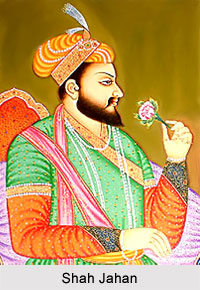 Religion during Shah Jahan was under the stringent control of the Emperor. During the initial period of his rule, he was very stern regarding the practice of other religions and a staunch follower of Islam. It may be noted here that the attitude of the different Mughal Emperors towards religion was markedly different from one another. This was because in this vast sub-continent, the Muslim rulers felt that they were precarious islands in the middle of a sea of Hinduism, and as a result, the attitude of the Mughals in regard to religion varied from one extreme to the other. Thus while there were liberal-minded emperor like Akbar who accepted all religions, there were also intolerant and orthodox emperors like Aurangzeb and Shah Jahan.
Religion during Shah Jahan was under the stringent control of the Emperor. During the initial period of his rule, he was very stern regarding the practice of other religions and a staunch follower of Islam. It may be noted here that the attitude of the different Mughal Emperors towards religion was markedly different from one another. This was because in this vast sub-continent, the Muslim rulers felt that they were precarious islands in the middle of a sea of Hinduism, and as a result, the attitude of the Mughals in regard to religion varied from one extreme to the other. Thus while there were liberal-minded emperor like Akbar who accepted all religions, there were also intolerant and orthodox emperors like Aurangzeb and Shah Jahan.
During the time when Shah Jahan ruled over the land, the religions of India were numerous. Hinduism itself was not monolithic: its four distinct castes- Brahmin at the top of the hierarchy, Kshatriya, the warrior caste, Vaishya or agriculturist, and finally the Sudras, each with their own code of conduct- were subdivided into a multitude of sub-castes (there are also sects like the Jains (510 BC), or the mysterious tantric cult of Kali). Then there was the Sikh religion, founded by Guru Nanak (1469-1538), a monotheistic religion with its own sacred book, the Guru Granth Sahib, that preached equality. Buddhism still maintained its adherents in several comers of the country, and there were also the innumerable pagan religions of the various tribes in the northern hill tracts, Assam, and the southern peninsula.
Shah Jahan favoured Islam. He was a Sunni Muslim who dressed in Muslim fashion, did not permit the Hindus to wear Muslim dress, sported a beard, used alcohol in a restrained manner, prayed regularly and kept fasts on Ramzan. During the early years of his reign he exhibited fanaticism also. He stopped the practice of Hindus keeping Muslim slaves, imposed pilgrimage tax on the Hindus, though he removed it shortly afterwards, and stopped the celebration of Hindu festivals at the court. Temples in Varanasi, Allahabad, Gujarat and Kashmir were broken during his reign. Shah Jahan encouraged conversion to Islam throughout his reign. During his reign the war-captives were converted to Islam, culprits who accepted Islam were left free. Hindus were forced to accept Islam before their marriage to Muslims and those who disrespected either the holy Quran or Prophet Muhammad were punished to death. He created a separate department for conversion of people of other faith to Islam. He sent presents to Mecca regularly. Thus, it is clear that he set aside the policy religious toleration of Akbar and believed in the supremacy of Islam.
However, Shah Jahan`s zeal to support Islam slowly slackened and his regulations were not enforced during the later period of his rule. This was probably due to the influence of the liberal views of his favourite son Dara Shikoh and his daughter Jahanara. Dara was quite broad minded in his religious views, in fact he was unusually eclectic to the extent that many considered him a heretic. The necessity of getting the loyalty of Hindu nobles too might have been another reason. During this later period of his rule, Shah Jahan continued the Hindu practices of Jarokha Darshan, and put no burden of additional taxes on members of other religions. Destruction of Hindu temples was also stopped during this time. Shah Jahan even showed a reverence for Hindu scholars. Kavindra Saraswati, Sundar Das, Chintamani etc. received patronage at his court. A few Sanskrit texts were translated into Persian under the patronage of Prince Dara Shikoh. The Hindus were given state services on merit. Raja Jaswant Singh and Rai Singh were well rewarded by him. He had rebuked Prince Aurangzeb because of his ill-treatment of the Rajputs. Musicians, dancers, painters etc. of all faith were patronised at his court.
Thus, as he approached the later period of his reign, Shah Jahan did not persecute people of other faiths and whatever fanaticism he exhibited during the early period of his rule was abandoned during the latter period. Therefore, it is keeping this view in mind that his period of rule cannot be regarded as the period of religious intolerance, even though it is quite clear that his policy was definitely rather prejudiced as compared to the policy of his father and his grandfather.



















